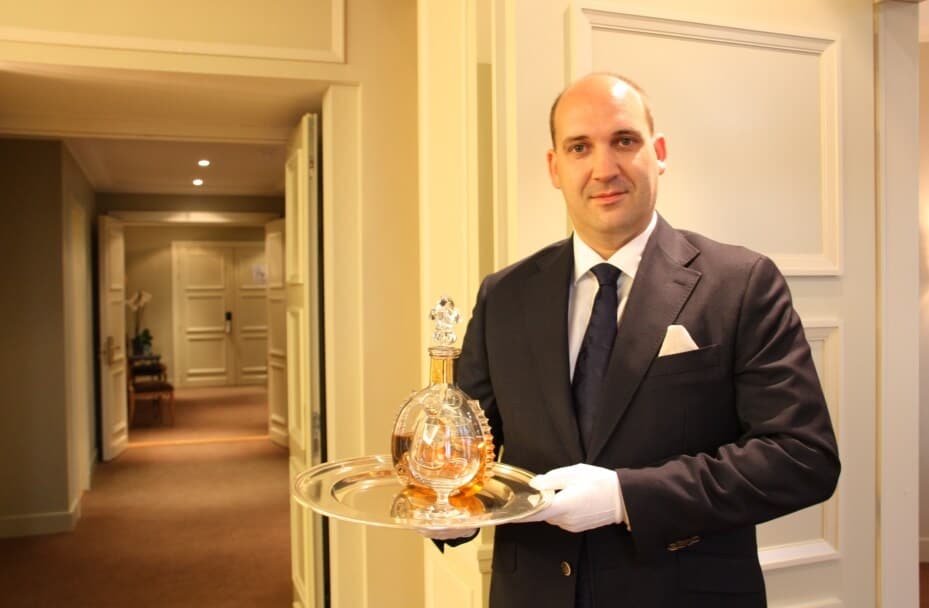At your Service – Flanders Today
From Bertie Wooster’s Jeeves to Bruce Wayne’s Alfred to Jabba the Hutt’s Bib Fortuna, the butler has become a fixture in the popular imagination. The archetypal valet is a human Swiss army knife, able to carry out any task required by his boss, who is often only half as competent for all his blue blood. And yet the butler remains loyal through thick and thin.
Unless you’re playing Clue, in which case he might have “dunnit”.
Such is the butler as he exists in pop culture. Very few of us, of course, have met a flesh-and-blood butler, nor do we have a very good idea of what the job really entails. Make no mistake: it is a job, and it requires—in addition to a certain natural equilibrium—a good deal of specialised training.
That’s where Vincent Vermeulen comes in. The Flemish entrepreneur has recently founded the School for Butlers and Hospitality in Brussels. We sat down together in the capital to talk buttling (yes, it’s a real word).
Vermeulen is a bit of an expert on the subject. “I was literally born in the hospitality industry,” he says. Indeed, he comes from a long line ( four generations, to be exact) of hospitality professionals. His parents ran a hotel-and-restaurant operation on the Belgian coast, hence his passion for service and lifetime of practical experience in the field.
After growing the family business in partnership with his brother, Vermeulen decided to explore the world of service from a different angle. So, 11 years ago, he decamped for the UK. He first trained at the Guild for Professional English Butlers, then embarked on a decade-long odyssey through the world of über-high-end hospitality, an odyssey which took him to London’s legendary Lanesborough Hotel and beyond.
Vermeulen knew all the while, however, that his destiny was in education. “The idea of starting my own school has been in my mind since that first day at the Guild,” he says. “This was the logical next step for me.”
The butler recently returned to Belgium with a plan and the endorsement of the British Butler Institute. The School for Butlers and Hospitality was born. Vermeulen describes the enterprise as “the best of British tradition coupled with all things Belgium has to offer.” His tri-annual courses are designed for small groups of no more than 12 students. The first of these is set to embark on the road to butler-hood in September. Their classroom is Brussels’ sumptuous Le Plaza Hotel.

Vermeulen’s butlers-in-training will master a broad range of tasks such as housekeeping, serving drinks, packing suitcases, making travel arrangements, managing staff, maintaining protocol and procuring the right luxury goods (after all, not all caviars and champagnes are created equal). Record-keeping is also a crucial component of buttling. “Today’s butler is a professional organiser,” Vermeulen explains. “He needs to log every detail about the house.” Candidates will even learn the fine art of ejecting inebriated or unruly guests from the table.
In keeping with Vermeulen’s emphasis on practical experience, there are also hands-on field trips to luxury destinations and brand headquarters. Students will stand on the shoulders of giants: the tailors of D’Longueville, the tanners of JM Weston, the silversmiths of Christofle, the champagne-makers of Bollinger and the gourmets of Bruges’ triple-Michelin-starred restaurant De Karmeliet.
Graduates will benefit from these partners and contacts long after the course is over. Vermeulen’s international network is a veritable placement service for an industry in which recommendations and reputations are everything. It’s about who you know. It’s about what you know. But above all, it’s about who knows what you know. Vermeulen’s already on-going butler-for-a-day programme, in which candidates are placed with clients looking to engage a butler for a special event, is an example of the opportunities available at the ground level.
Then there are the full-time butler positions opening up around the world. “The demand is overwhelming,” says Vermeulen. “Butlers are needed on yachts and in Asia’s booming high-end hotels. Successful people want to use their time as efficiently as possible and employ a butler to run the household.”
If the possible rewards are substantial, though, so is the initial investment. The four-week course will set an aspiring butler back €6,980—and this doesn’t include room and board. Vermeulen insists that his fees are comparable to other programmes in the field and, most importantly, that these skills and opportunities will pay off in the long-term.
It certainly is worth considering, especially in light of the increasingly bleak economic forecast for us middle-class plebs and the increasingly conspicuous consumption practiced by the super-rich, whose only crisis is mid-life. If you can’t beat ’em, join ’em.